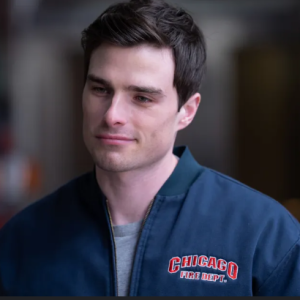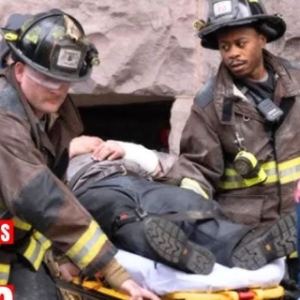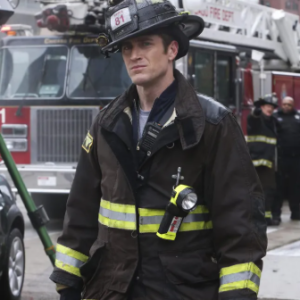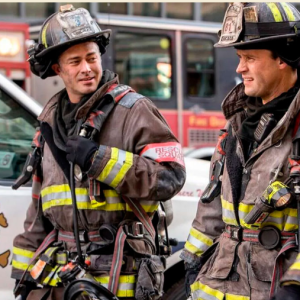For over a decade, Chicago Fire has thrived on a mix of high-stakes rescues, emotional bonds, and the kind of workplace drama that feels both larger than life and deeply personal. As Season 14 approaches, longtime fans are discovering that the most explosive fire isn’t roaring inside a burning building—it’s smoldering within one of the show’s most beloved characters: Christopher Herrmann. While new Chief Dom Pascal has drawn plenty of suspicion since his arrival, the real twist is that Herrmann’s identity crisis traces back not to Pascal, but to none other than the departed cornerstone of Firehouse 51, Chief Wallace Boden. For years, Boden embodied strength, wisdom, and continuity, but in leaving his post, he unintentionally ignited a firestorm in Herrmann’s soul—one that may consume his confidence, his career, and even his closest relationships. What we’re witnessing now is not just another subplot; it’s the unraveling of a man who once seemed unshakable, and the ripple effects threaten to redefine Firehouse 51 forever.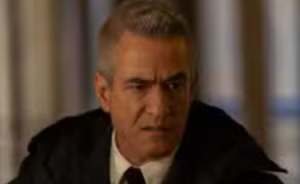
When Eamonn Walker’s Chief Boden stepped away in 2024 after twelve powerful seasons, it marked the end of an era. For fans, it was like losing the show’s moral compass, the steady anchor who always placed team above self. But Boden didn’t just leave quietly; he left with a declaration that reshaped Herrmann’s destiny. In a charged private moment during the Season 12 finale, Boden told Herrmann, “When I’m gone, I want you to take my place.” That single line, delivered with the gravitas only Boden could muster, was more than a compliment—it was a coronation. Herrmann, who had always seen himself as the scrappy lieutenant, the passionate firefighter who led with his heart, suddenly had a new identity thrust upon him: heir to the chief’s chair. It was inspiring, terrifying, and life-altering all at once. Herrmann never asked for the burden, but once Boden planted the seed, it grew roots. The man who never envisioned himself beyond Engine 51’s lieutenant now felt the weight of destiny pressing down on his shoulders, demanding that he rise or risk dishonoring Boden’s faith in him.
Yet destiny has a cruel way of colliding with reality. Herrmann didn’t have the qualifications, certifications, or administrative training to step into Boden’s shoes immediately. The Chicago Fire Department had no time to wait for him to catch up. Enter Chief Dom Pascal, a seasoned yet rigid outsider who represented everything Herrmann wasn’t—calculated, by-the-book, and unburdened by Firehouse 51’s emotional history. From the start, Pascal’s arrival felt like an intrusion, especially to those who had lived under Boden’s inclusive, almost familial leadership. Kidd clashed with him, the crew bristled, and fans wondered whether Pascal would ever be accepted. But while Pascal fought to fit in, Herrmann battled himself. He studied for the exams, pushed through the bureaucracy, and inched toward fulfilling Boden’s prophecy—until he stunned everyone with a single selfless act. In the Season 13 finale, Herrmann voluntarily stepped down from his role as lieutenant, handing the reins to his lifelong friend Mouch. It was the ultimate Herrmann move, prioritizing loyalty and camaraderie over personal ambition. But in doing so, he may have walked away from the very future Boden envisioned for him. Was it a moment of wisdom or weakness? Fans are still debating, but one thing is certain: Herrmann’s path is now more uncertain than ever.
Season 14 promises to explore this uncharted territory, placing Herrmann in the rare position of being “just another firefighter” for the first time in years. At face value, he seems at peace with the decision, content to serve without the burden of leadership. But beneath the surface, storm clouds gather. Financial realities loom—higher ranks mean better pay, and Herrmann still has a family depending on him. The ghost of ambition haunts him too, because once a man has been told he is destined for greatness, how does he return to ordinary life without feeling diminished? And then there’s the ticking time bomb of his friendship with Mouch. For decades, they have been brothers in arms, inseparable in both loyalty and humor, but power changes dynamics. Will Herrmann truly be able to stand behind Mouch as his subordinate, or will resentment creep in if Mouch thrives in the position that Herrmann abandoned? These emotional landmines are set to detonate, creating one of the richest storylines Chicago Fire has attempted in years—less about external disasters and more about the internal inferno that can burn a man from the inside out.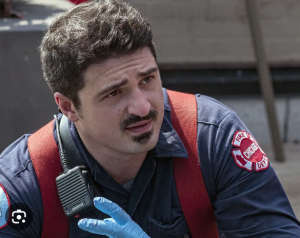
In the end, the irony is sharp and poignant: the man fans may come to blame for Herrmann’s crisis is not Dom Pascal at all but Wallace Boden, the mentor who loved him enough to believe in his potential. Boden’s faith was meant as a blessing, yet in passing the torch too soon, he created an expectation that Herrmann could neither ignore nor immediately fulfill. The emotional complexity is staggering, because Herrmann doesn’t resent Boden—he reveres him. What hurts most is that Boden’s words still echo, whispering that he was meant for more. This is not a battle against Pascal, nor against the system—it’s a battle inside Herrmann’s heart. Who is he if he is not a lieutenant, not a chief, but something undefined in between? That question cuts deeper than any injury, any fire, any external challenge. And in answering it, Chicago Fire may deliver its boldest narrative gamble yet: a season centered less on flames and rescues, and more on the very identity of a man who has been with the show since its inception. As the sirens wail into Season 14, fans are holding their breath, not just for the next daring rescue, but for the salvation of Christopher Herrmann’s soul.
